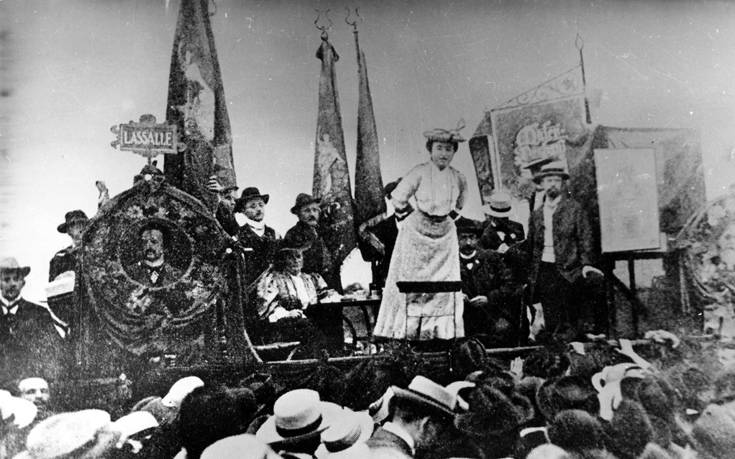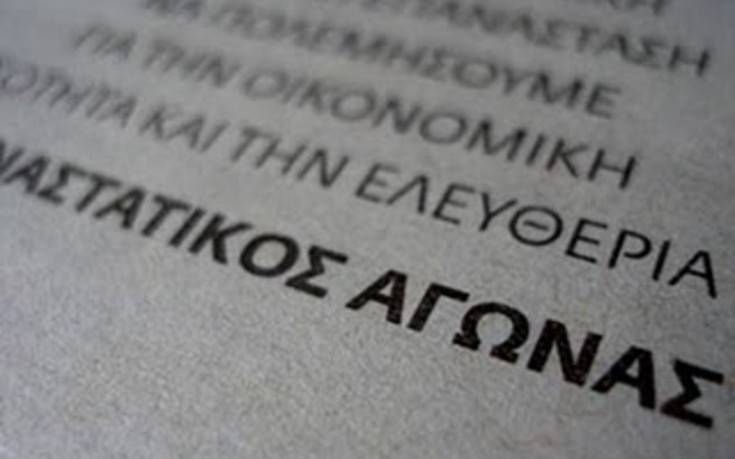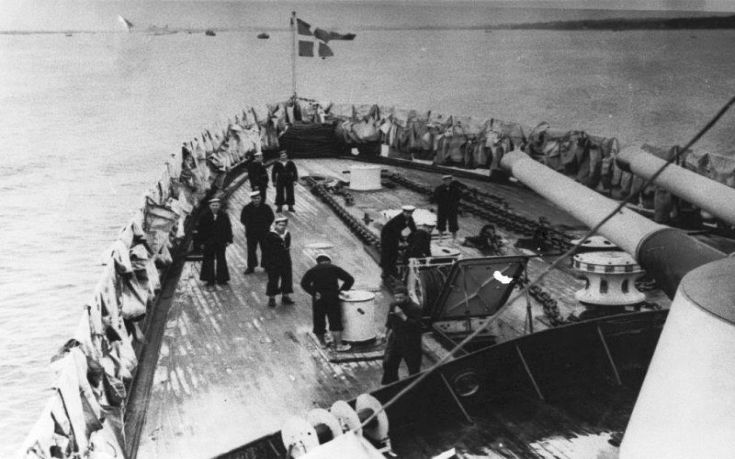Read the most important events that happened today.
1477: The army of Charles, the powerful Duke of Burgundy, fails to capture Nancy. It is defeated by the forces of Switzerland and Lorraine. Charles himself is killed in battle.
1500: Ludovic Sforza occupies Milan.
1643: The first divorce in American history is recorded. A Massachusetts court is divorcing Anne Clark because her husband Dennis cheated on her and left the home.
1668: Methodius III is elected Ecumenical Patriarch.
1781: American Revolution: British naval forces, led by Benedict Arnold, burn Richmond, Virginia.
1822: Elias Mavromichalis, son of Petrobei, leader of about 600 Manians, lands in Aliveri and assumes the leadership of the Revolution in Evia for the liberation of Karystos.
1825: The writer Alexandros Doumas participates for the first time in a duel, during which he is almost not injured at all. The only thing he loses is his. Pants, which will fall off during the duel.
1837: With its resolution, the Municipality of Athens requests from King Otto the provision of a Constitution.
1875: The Paris Opera opens its gates.
1889: The word hamburger first appears in the Washington newspaper Walla Walla Union.
1895: French officer Alfred Dreyfus is dishonorably removed from his post in the precinct of the Military School with a broken sword and sentenced to life in prison on Devil's Island, in one of the biggest court cases.
1913: The Battle of Lemnos: Three Greek battleships and eight destroyers, led by the legendary battleship Averof, fight the Turkish Fleet and force it to hide permanently in the Straits. The Turks are counting great material and human losses, while from the Greek side there is only one wounded.
1914: Ford is announcing a five-day working week, an eight-hour schedule and a minimum wage of $ XNUMX for its employees.
1919: In Germany, the Nazi Party, originally called the German Workers' Party, was founded by a locksmith, Anton Drexler, a civil engineer, Gottfried Feder, and a playwright, Dietrich Eckart. It would later be renamed the National Socialist Party of German Workers (NSDAP). The 54th member of the party to be registered is the then infamous Adolf Hitler who will take over in 1923.
1919: The "Spartacist" uprising broke out in Berlin, with the aim of establishing communist rule on the model of the Soviet Union. She will end up drowning in blood a week later, while her leaders Rosa Luxemburg and Carl Liebknecht will be assassinated.

1929: A large fire in the center of Piraeus destroys hundreds of businesses, causing damage of 20 million drachmas.
1930: The Soviet government set up agricultural productive cooperatives, the infamous "kolkhozes".
1933: Construction begins on the famous Golden Gate Bridge in San Francisco, USA.
1939: Amelia Earhart, the first female aviator, is declared dead. She had been missing since July 2, 1937.
1940: Five experimental radio stations manage to broadcast on FM radio, across five US states. This action is considered the premiere of the widespread use of FM in radio.
1941: The Greek destroyers "Queen Olga", "King George", "Spetses", "Fisherman" and "Koundouriotis" pass through the Strait of Otranto, controlled by the Italian Fleet, and bomb the Italian positions in the Gulf of Avlona.
1943: 11-year-old Elizabeth Taylor signs her first contract with the production company MGM and shoots her first film "Lassie Come Home".
1944: The London Daily Mail becomes the first overseas newspaper.
1945: ELAS forces are forced to leave Athens and Piraeus, under pressure from superior government and British forces.
1948: Warder Bros. is back in color for the first time. It is the final of the "Rose Bowl".
1949: US President Harry Truman announces the Fair Deal, which deals with social security, wage increases and infrastructure, such as electricity, flood defenses, etc.
1950: A fuel transport scandal involving People's Party officials is revealed in Greece.
1959: Panagiotis Kanellopoulos, after leaving the People's Party, enters the government of Konstantinos Karamanlis as vice president.
1964: The ecumenical patriarch of Athenagoras meets Pope Paul VI at the Mount of Olives. It is the first meeting of the leaders of the two Churches since the time of the Ferrara-Florence Synod in 1438.
1968: Alexander Dubcek succeeds Antonin Novotny as chairman of the Communist Party of Czechoslovakia. He will take liberal measures, which will lead in August of the same year to the invasion of the military and its "opening". (Spring in Prague).
1972: Vassilios Lymperis sets fire to the house of his estranged wife, causing the death of her, her mother and his two children, aged two and a half years. He will be sentenced to death and executed.
1980: Hewlett-Packard announces the release of the first PC.
1981: The president of PASOK, Andreas Papandreou, the leadership of the KKE and KKE (es.) And George Mavros do not participate in the official ceremony of our country's accession to the EEC.
1998: Vandals decapitate the "Little Fairy", the symbol of Copenhagen.
2002: According to his memorandum, the deposed monarch Konstantinos Gluxburg demands from the Greek state more than 190 billion drachmas, asking for additional compensations for "pain and humiliation", in addition to his claims for movable and immovable property. The ousted monarch should apologize and not compensate, the government replies.
2009: Lion Panetta, a former White House chief of staff under Bill Clinton, has been named the new CIA chief by Barack Obama.
2009: The terrorist organization "Revolutionary Struggle" launches a Kalashnikov attack on police officers of the A-542 squad at the Ministry of Culture. Diamantis Matzounis is injured in the attack.

2011: New Democracy leader and main opposition leader Antonis Samaras, in a letter to European Commission President Jose Manuel Barroso, described the Eurobond issuance as the only way out of the debt crisis, not just for the member states facing problems, but also for the eurozone as a whole.
Births
1209 - Richard I, Earl of Cornwall
1425 - Henry IV, King of Castile
1639 - Otto Wilhelm von Koenixmark, Swedish soldier
1846 - Rudolf Oiken, German philosopher and writer
1867 - Dimitrios Gounaris, Greek politician
1876 - Konrad Adenauer, German politician
1878 - Stylianos Galeros, Greek chief
1893 - Paramhansa Yogananda, Indian guru
1909 - Stephen Klein, American mathematician
1913 - Konstantinos Bovolinis, Greek politician
1921 - Friedrich Direnmat, Swiss writer
1928 - Zulfiqar Ali Bhutto, Pakistani politician
1931 - Juan Goitisolo, Spanish writer
1931 - Robert DiWall, American actor
1932 - Uberto Eco, Italian philosopher and writer
1938 - Juan Carlos I, King of Spain
1941 - Hayao Miyazaki, Japanese director
1942 - Terence Moss, Spanish writer
1946 - Diane Keaton, American actress
1950 - Krzysztof Vielicki, Polish climber
1956 - Frank-Walter Steinmeier, German politician
1959 - Clancy Brown, American actor
1966 - Dimitris Vassiliadis, Greek athlete
1968 - DJ BoBo, Swiss singer
1969 - Marilyn Manson, American singer
1972 - Sakis Rouvas, Greek singer
1973 - Georgia Apostolou, Greek actress
1975 - Bradley Cooper, American actor
1975 - Angelo Figus, Italian fashion designer
Deaths
1066 - Edward the Confessor, King of England
1387 - Peter IV, King of Aragon
1430 - Philip of England, Queen of Denmark
1441 - John II of Linus, French nobleman
1465 - Charles I, Duke of Orleans
1477 - Charles, Duke of Burgundy
1589 - Catherine of Medici, Queen of France
1592 - William, Duke of Jülich-Klevis-Burke
1625 - Simon Mager, German astronomer
1762 - Elizabeth, Empress of Russia
1808 - Alexios Orloff, Russian soldier
1896 - James Wallace Black, American photographer
1900 - Henry Tracy Coxwell, English aeronaut
1910 - Leon Valras, French economist
1910 - Nikolaos Diligiannis, Greek politician
1922 - Ernest Sackleton, Irish explorer
1930 - Christos Koryllos, Greek politician
1933 - Calvin Coolidge, 30th President of the United States
1936 - Ramon del Vallee-Inklan, Spanish writer
1952 - Christo Tatarchev, Bulgarian revolutionary
1970 - Max Bourne, German physicist
1972 - Konstantinos Nikolopoulos, Greek fencing athlete and politician
1975 - Ioannis Athitakis, Greek politician
1992 - Ioannis Karmiris, Greek theologian and academic
2007 - Momofuku Ando, Taiwanese businessman
2007 - Pizza Bournozou, Greek actress
2014 - Eusebio (according to Eusebio Da Silva Ferreira), Portuguese footballer
